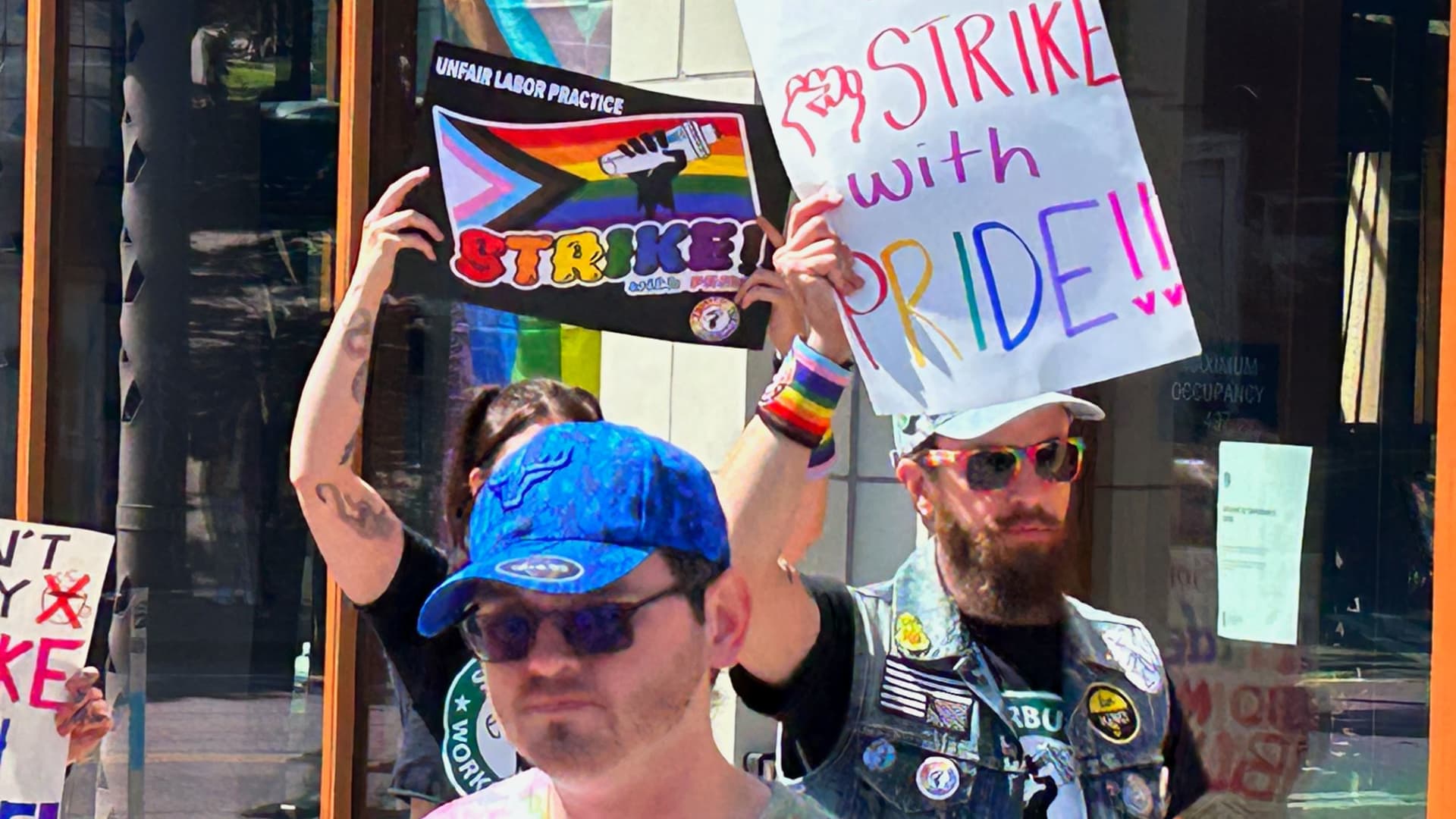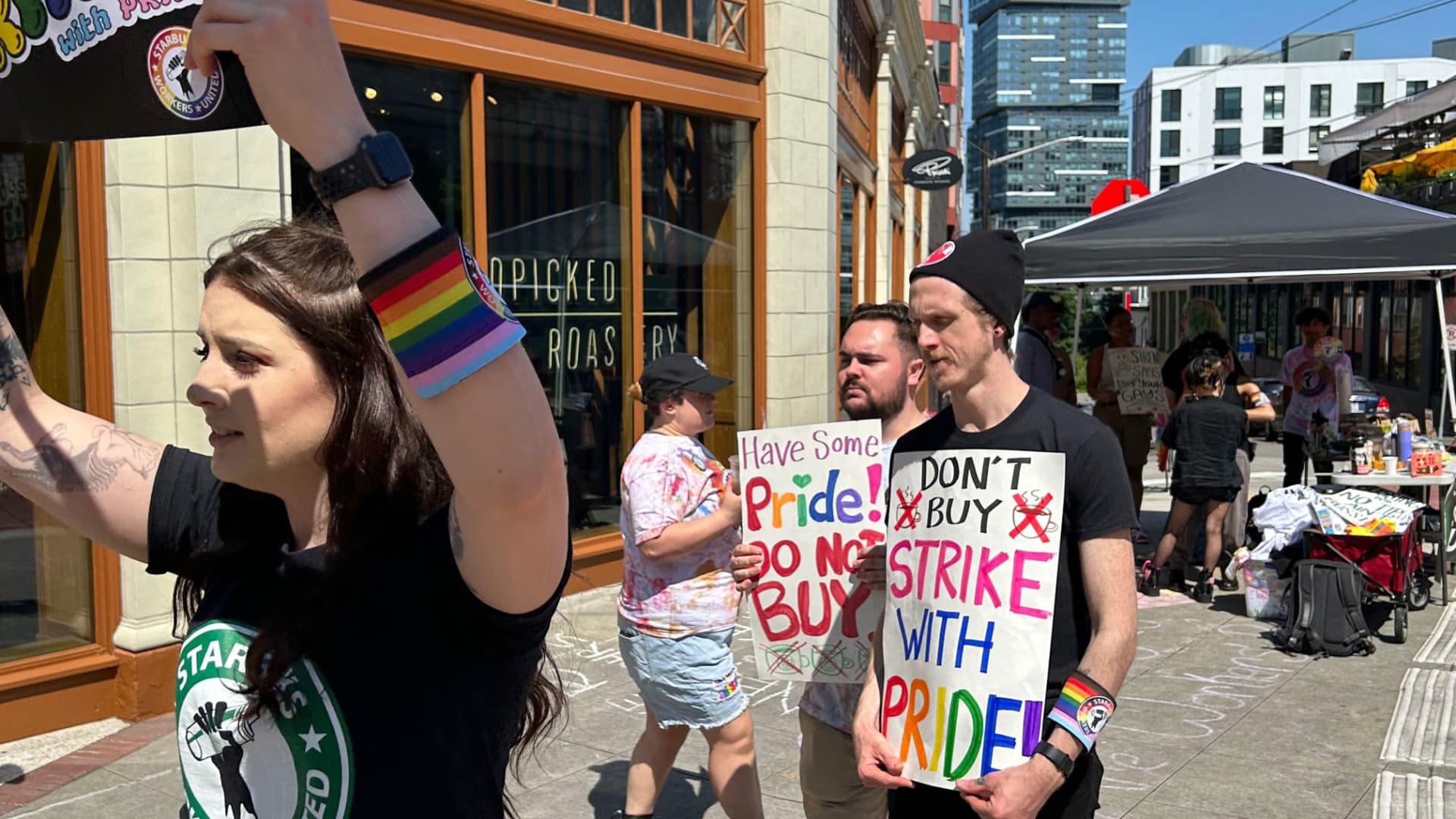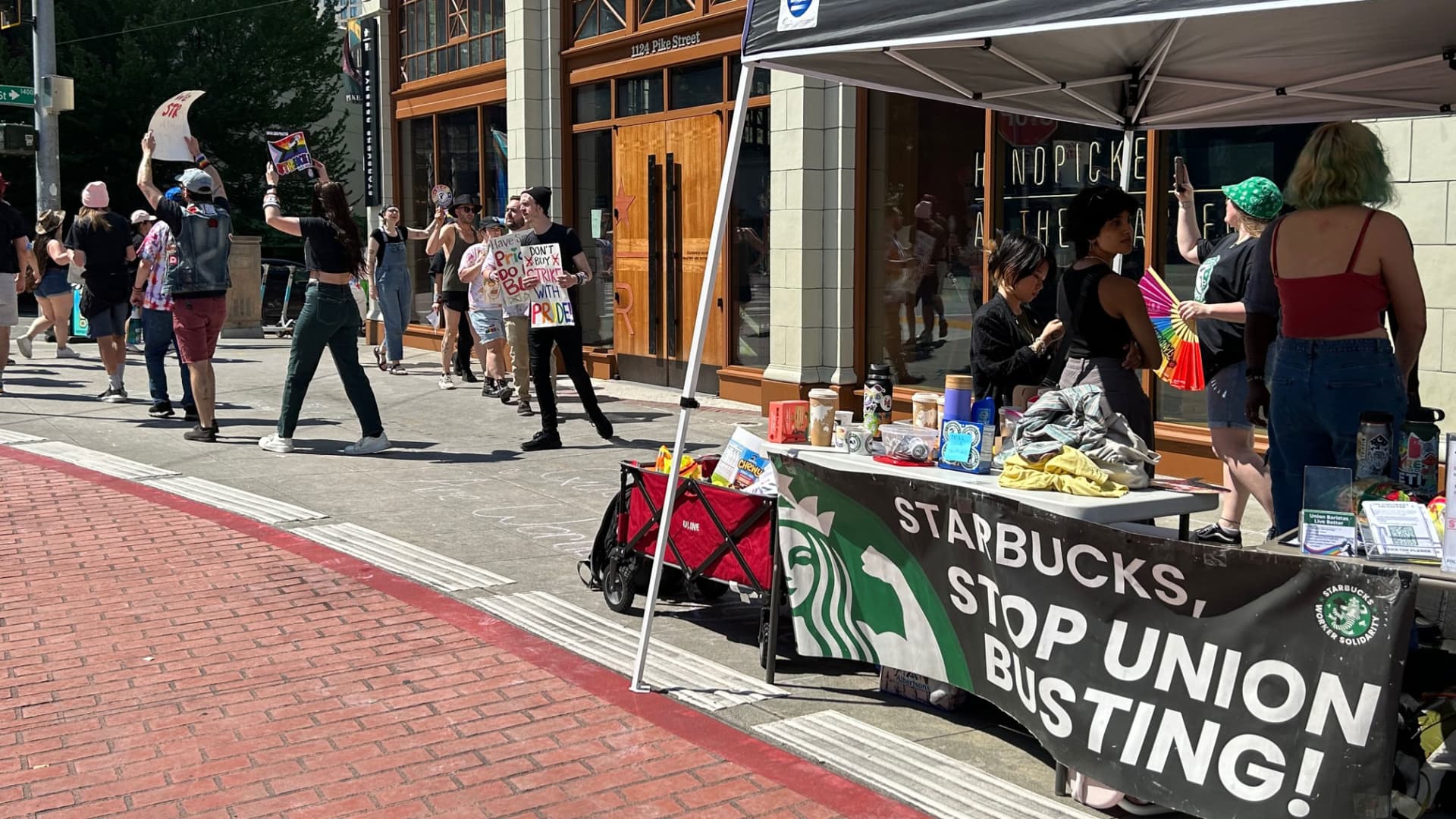
- Strikes at more than 150 organized U.S. Starbucks stores started Friday in Seattle, after the union representing baristas claimed some cafes were not allowed to put up Pride decorations.
- The coffee giant said its policy on decorating has not changed and that it unwaveringly supports the LGBTQ+ community.
- Workers United has alleged instances in at least 22 states when workers have not been able to decorate. It says it filed an unfair labor practice charge over the alleged change in policy.
Strikes at some organized U.S. Starbucks stores started Friday in Seattle, after the coffee giant and the union representing baristas publicly clashed over claims that the company was not allowing Pride month decor in cafes.
The union, Starbucks Workers United, said more than 150 stores representing nearly 3,500 workers have pledged to join the strikes, which will take place over the next week. More than two dozen additional stores are voting on strike authorizations and the count could rise to nearly 200 stores by the end of the week, the union said.
Last week, the union alleged dozens of U.S. stores were not allowing employees to decorate for Pride month, accusations that suggested a wave of backlash against LGBTQ+ inclusion had reached a perceived liberal bastion in corporate America. Starbucks said it had not revised its guidelines for store decorations.
The Hurricane season is on. Our meteorologists are ready. Sign up for the NBC 6 Weather newsletter to get the latest forecast in your inbox.
"We want to be crystal clear – Starbucks has been and will continue to be at the forefront of supporting the LGBTQIA2+ community, and we will not waver in that commitment!" Starbucks CEO Laxman Narasimhan and Executive Vice President and President for North America Sara Trilling said in a statement Friday.
"Despite today's public commentary, there has been no change to any of our policies as it relates to our inclusive store environments, our company culture and the benefits we offer our partners. We continue to encourage our store leaders to celebrate with their communities including for U.S. Pride month in June, as we always have," they added. The executives said they "strongly disapprove of any person or group, seeking to use our partners' cultural and heritage celebrations to create harm or flagrantly advance misinformation for self-interested goals."
In response to the strike pledges, the company earlier said, "Workers United continues to spread false information about our benefits, policies and negotiation efforts—a tactic used to seemingly divide our partners and deflect from their failure to respond to bargaining sessions for more than 200 stores."
In a post on its website, Starbucks shared a June 14 letter from its VP of Partner Resources, May Jensen, to Workers United President Lynne Fox demanding the union "cease from knowingly misleading partners."

Workers United has alleged instances in at least 22 states when workers have not been able to decorate, pointing to social media accounts where workers have documented their claims. The union said it has filed an unfair labor practice charge against Starbucks over what it alleges is a change in policy. Some of the strikes in the coming days are tied to that claim.
U.S. & World
Not all of the stores that will strike had issues related to Pride decor.
Parker Davis, a 21-year-old barista in San Antonio, Texas, works at a store that has not had a dispute around Pride decor but will be a part of the strikes.
"There's a large percentage of partners at my store who are part of the LGBTQ community, and who feel that Starbucks' continued actions with trying to limit or take down pride decorations just doesn't make sense with what the company has done in the past," Davis said.
Davis told CNBC he expects several picketers, but said it was unclear if the store would be able to open during the strike.
The public back-and-forth over decorations to celebrate Pride month comes as major brands including Target and Bud Light have been targeted for supporting the LGBTQ+ community. In both of those cases, the companies faced opposition from conservative consumers to partnerships with or merchandise for transgender people — and then saw backlash from more liberal customers for perceived deference to the critics.
In Oklahoma, workers were told restrictions on decorating were out of a concern for safety after recent attacks at Target stores, the union said.

The Starbucks workers are also striking over claims that the coffee chain is dragging its feet on negotiating contracts.
"Good faith bargaining looks like both sides providing proposals and trying to meet in the middle — Starbucks is not willing to do that," Workers United said in a statement. "Despite having our non-economic proposals for over 8 months and our economic proposals for over a month now, Starbucks has failed to tentatively agree to a single line of a single proposal or provide a single counter proposal. What Starbucks is doing is not bargaining, it's stalling."
The strike "is important to me because it sends the message that we are not going to stand idly by while Starbucks continues to delay contract negotiations and continues to participate in union busting," Davis said.
For its part, Starbucks maintains Workers United has responded to only a quarter of the more than 450 bargaining sessions Starbucks has proposed for individual stores nationally, to date, and said it is committed to progressing negotiations toward a first contract.

The roastery where the strikes started Friday has not had any disputes over Pride decorations, but is also striking in solidarity. About two dozen unionized employees protested outside the store during the day. The location was closed after it briefly opened, a Starbucks spokesperson said.
"The roastery wants to show solidarity with all workers that have been discriminated against in the company," Mari Cosgrove, a 28-year-old barista at the Seattle location, told CNBC.
"Frankly, it feels like an attack when these flags are taken down," Cosgrove said. "The partners in these stores really appreciate being able to be seen and feel like this is a community space for them. Starbucks has really prided itself on being a third place, including for its workers."
More than 300 company-owned stores have voted to unionize since the first filing took place in August of 2021, but Starbucks and Workers United have yet to agree to a contract.
Starbucks has more than 9,000 company-owned locations in the U.S.
— CNBC's Amelia Lucas contributed to this report.



